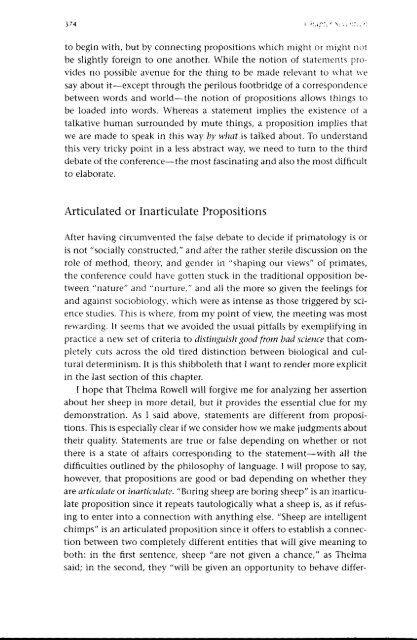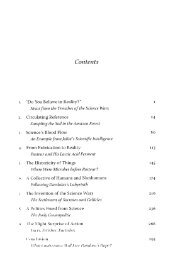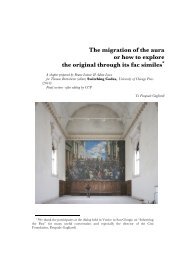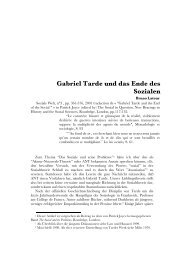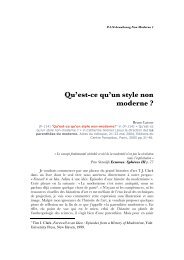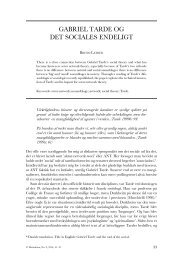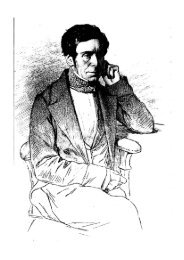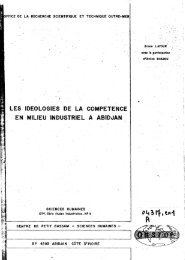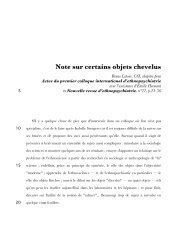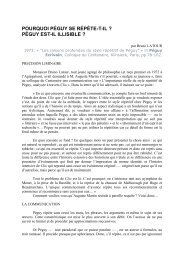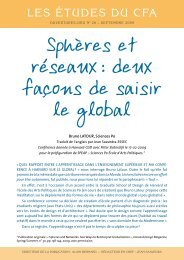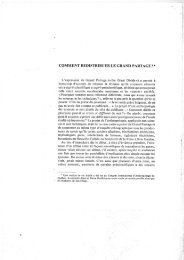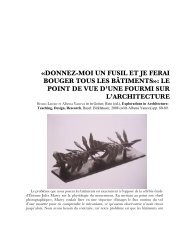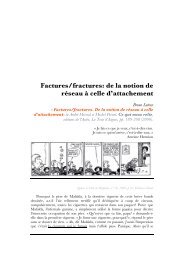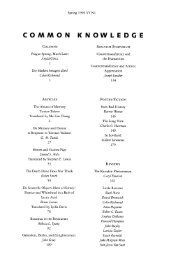A Well-Articulated Primatology - Bruno Latour
A Well-Articulated Primatology - Bruno Latour
A Well-Articulated Primatology - Bruno Latour
Create successful ePaper yourself
Turn your PDF publications into a flip-book with our unique Google optimized e-Paper software.
i 7 4<br />
to begin with, but by connecting propositions which r.night or nright nrrt<br />
be slightly foreign to one another. While the notion of statements I)rovides<br />
no possible avenue for the thing to be made relevant to rr-hat rve<br />
say about it-except through the perilous footbridge of a correspondence<br />
between words and world-the notion of propositions allon's things tcr<br />
be loaded into words. Whereas a statement implies the existence of a<br />
talkative human surrounded by rnute things, a proposition impiies that<br />
we are made to speak in this way by'what is talked about. To understand<br />
this very tricky point in a less abstract way, we need to turn to the third<br />
debate of the conference-the most fascinating and also the most diftcult<br />
to elaborate.<br />
<strong>Articulated</strong> or Inarticulate Propositions<br />
After having circumvented the false debate to decide if primatology is or<br />
is not "socially constructed," and after the rather sterile discussion on the<br />
role of method, theory, and gender in "shaping our views" of primates,<br />
the conference could have gotten stuck in the traditional opposition between<br />
"nature" and "r'rurture," and all the more so given the feelings for<br />
and against sociobiologv, u'hich were as intense as those triggered by science<br />
studies. This is rvhere, from my point of view, the meeting was most<br />
rervarding. lt seems that we avoided the usual pitfalls by exemplifying in<br />
practice a new set of criteria to distirrguish good frotn bad science that completely'<br />
cuts across the old tired distinction between biological and cultural<br />
determinism. It is this shibboleth that I want to render more exDlicit<br />
in the last section of this chapter.<br />
I hope that Thelma Rowell will forgive me for analyzing her assertion<br />
about her sheep in more detail, but it provides the essential clue for my<br />
demonstration. As I said above, statements are different from propositions.<br />
This is especially clear if we consider how we make judgments about<br />
their quality. Statements are true or false depending on whether or not<br />
there is a state of affairs corresponding to the statement-with all the<br />
difftculties outlined by the philosophy of language. I u'ill propose to say,<br />
howevel that propositions are good or bad depending on whether they<br />
are articulate or inarticulate. "Boring sheep are boring sheep" is an inarticulate<br />
proposition since it repeats tautologically what a sheep is, as if refusing<br />
to enter into a connection with anything else. "Sheep are intelligent<br />
chirnps" is an articulated proposition since it offers to establish a connection<br />
between two completely different entities that will give meaning to<br />
both: in the ftrst sentence, sheep "are not given a chance," as Thelma<br />
said; in the second, they "will be given an opportunity to behave differ-


